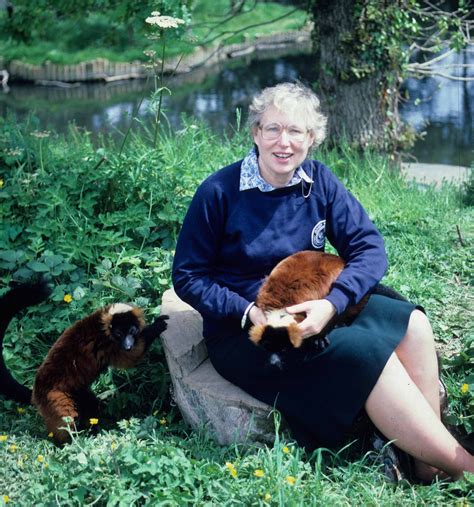A Quote by Frans de Waal
The evolutionary struggle for survival is really a self-serving series of blows and stabs, and yet it can lead to extremely social animals like dolphins, wolves or, for that matter, primates.
Related Quotes
Conversation with animals could happen, but I think it would be easier for it to happen with creatures we share a bit more with - those that have been bred to interact with us, like dogs or horses, or ones to whom we have a natural evolutionary link, like chimps and other nonhuman apes. I mean, we do communicate with dolphins and whales, but we're not trying to get to the depths of their understandings. I feel that with animals as different from us as the whales and dolphins, it's likely to work better with us just watching them and trying to figure them out.
Primates stand at a turning point in the course of evolution. Primates are to the biologist what viruses are to the biochemist. They can be analysed and partly understood according to the rules of a simpler discipline, but they also present another level of complexity: viruses are living chemicals, and primates are animals who love and hate and think.
Considering that we live in an era of evolutionary everything---evolutionary biology, evolutionary medicine, evolutionary ecology, evolutionary psychology, evolutionary economics, evolutionary computing---it was surprising how rarely people thought in evolutionary terms. It was a human blind spot. We look at the world around us as a snapshot when it was really a movie, constantly changing.
There are good reasons why natural selection has become widely accepted as an explanation of evolutionary development. When applied to mammals and other large animals, it fits perfectly. But we cannot assume that all evolutionary steps arise from selection, particularly when looking at smaller animals.
I think that intelligence is such a narrow branch of the tree of life - this branch of primates we call humans. No other animal, by our definition, can be considered intelligent. So intelligence can't be all that important for survival, because there are so many animals that don't have what we call intelligence, and they're surviving just fine.
All stories are about wolves. All worth repeating, that is. Anything else is sentimental drivel. ...Think about it. There's escaping from the wolves, fighting the wolves, capturing the wolves, taming the wolves. Being thrown to the wolves, or throwing others to the wolves so the wolves will eat them instead of you. Running with the wolf pack. Turning into a wolf. Best of all, turning into the head wolf. No other decent stories exist.
Animals engage in a struggle for existence; for resources, to avoid being eaten and to breed. Environmental factors influence organisms to develop new characteristics to ensure survival, thus transforming into new species. Animals that survive to breed can pass on their successful characteristics to offspring.
We talked about how easy it was to make the mistake of anthropomorphizing animals, and projecting our own feelings and perceptions on to them, where they were inappropriate and didn't fit. We simply had no idea what it was like being an extremely large lizard, and neither for that matter did the lizard, because it was not self-conscious about being an extremely large lizard, it just got on with the business of being one. To react with revulsion to its behavior was to make the mistake of applying criteria that are only appropriate to the business of being human.




































